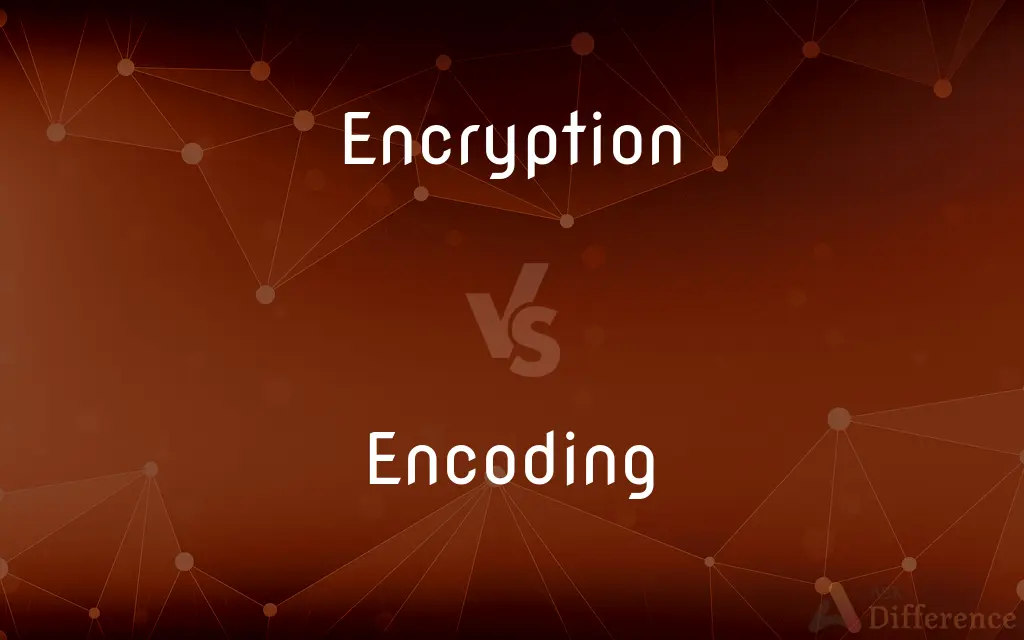Encryption vs. Encoding — What's the Difference?
By Tayyaba Rehman — Updated on September 22, 2023
Encryption conceals data to ensure security, requiring a key for decryption. Encoding changes data into another format for interoperability, not for secrecy.

Difference Between Encryption and Encoding
Table of Contents
ADVERTISEMENT
Key Differences
Encryption and Encoding are both methods of transforming data. However, their underlying purposes are quite different. Encryption is a process that seeks to render data unreadable to unauthorized users. It is driven by the need for security and confidentiality. With encryption, you often need a specific key to convert the unreadable data back to its original form. On the contrary, Encoding is about converting data from one format to another to ensure compatibility across systems. It doesn't necessarily aim to keep the data secret; it's more about ensuring that the data can be properly used and interpreted.
For instance, when you're entering sensitive details, like credit card information on a website, that data may be encrypted so that even if intercepted, it can't be easily understood. Encryption ensures that this data is secure and remains confidential. Encoding, on the other hand, might be used when a website is converting special characters in a URL to a format that can be transmitted over the internet without error. Its primary goal is data integrity and reliability, not secrecy.
Moreover, encrypted data can't be understood without the appropriate decryption key. This key is what transforms the scrambled data back to its original, understandable form. With encoding, the transformation is algorithmic and standardized – no special 'key' as such is needed to decode it, just the right algorithm or method.
The two aren't mutually exclusive either. In many IT scenarios, data can be both encoded and encrypted. It might first be encoded for system compatibility, then encrypted for security. Despite the overlap in application, it's crucial to understand that encryption is for security, while encoding is for data compatibility and integrity.
Comparison Chart
Purpose
Ensure data secrecy and confidentiality.
Transform data for compatibility across systems.
ADVERTISEMENT
Key Requirement
Usually requires a key for decryption.
Doesn't require a specific key; just the right method or algorithm.
Outcome
Produces unreadable data to unauthorized users.
Converts data into a different format but remains readable.
Reversibility
Decryption is needed to revert to original data.
Decoding reverts data to its original format.
Primary Concern
Security and confidentiality.
Data integrity and compatibility.
Compare with Definitions
Encryption
The process of converting data into a code to prevent unauthorized access.
To ensure security, the company uses advanced encryption techniques for its communications.
Encoding
Transforming information using predefined rules.
The MP3 encoding compresses audio files without significant loss of quality.
Encryption
A system to shield sensitive information from prying eyes.
Digital wallets use encryption to protect user information.
Encoding
The process of converting data into a specific format for efficient transmission or storage.
URL encoding ensures that web addresses are transmitted correctly over the internet.
Encryption
A method to protect digital information against theft or hacking.
Encryption is essential for online banking transactions.
Encoding
Systematic transformation of data for compatibility reasons.
Unicode encoding represents most of the world's writing systems in a standardized manner.
Encryption
Scrambling data so only someone with the right key can read it.
Her emails are encrypted, ensuring privacy.
Encoding
To convert (a message or other information) into code.
Encryption
The art of rendering data unintelligible without a specific decryption key.
Modern military communications employ robust encryption.
Encoding
To format (electronic data) according to a standard format.
Encryption
In cryptography, encryption is the process of encoding information. This process converts the original representation of the information, known as plaintext, into an alternative form known as ciphertext.
Encoding
(Genetics) To specify the genetic code for (a protein, for example).
Encryption
The process or result of encrypting data.
Encoding
To convert information into code.
Encryption
Cryptography.
Encoding
To format electronic data according to a standard format.
Encryption
(cryptography) The process of obscuring information to make it unreadable without special knowledge, key files, or passwords.
Encoding
(Genetics) To specify the genetic code for a protein.
Encryption
(cryptography) A ciphertext, a cryptogram, an encrypted value. Usually used with the preposition "of" followed by the value that is hidden in it.
Encoding
(computing) The way in which symbols are mapped onto bytes, e.g. in the rendering of a particular font, or in the mapping from keyboard input into visual text.
Encryption
The process of converting messages in ordinary language, or other information into a secret coded form that cannot be interpreted without knowing the secret method for interpretation, called the key.
Encoding
A conversion of plain text into a code or cypher form (for decoding by the recipient).
Encryption
The activity of converting from plain text into code
Encoding
Present participle of encode
Encoding
The activity of converting from plain text into code
Encoding
Changing the form or representation of data.
ASCII encoding represents text in computers using numbers.
Encoding
The method used to represent unique data in multiple formats.
Video streaming platforms utilize different encoding techniques to cater to various devices.
Common Curiosities
Can you decode encoded data without a specific key?
Yes, encoded data doesn't require a special key, just the right method.
Are Encryption and Encoding the same?
No, encryption is for security, while encoding ensures data compatibility.
Why is data encoded?
Data is encoded to ensure compatibility across various systems and platforms.
What's a common use of encryption?
Encrypting passwords or credit card details on online platforms.
Can I use both encryption and encoding on the same data?
Yes, data can first be encoded for system compatibility and then encrypted for security.
Why can't we just encrypt everything?
Constant encryption and decryption can be resource-intensive and might not be necessary for all data.
Is encrypted data always safe?
While encryption significantly enhances safety, no system is 100% immune to determined hackers.
Does encoding protect data from hackers?
No, encoding isn't primarily for secrecy, whereas encryption is.
Is Base64 a form of encryption?
No, Base64 is an encoding scheme.
Is ASCII an encryption method?
No, ASCII is an encoding system for characters.
Can encoding help in data compression?
Some encoding methods, like MP3 for audio, can compress data.
Is every encrypted data also encoded?
Not necessarily, but encrypted data can be encoded for system compatibility.
Does encoding change the actual data?
No, encoding changes its format or representation, not the actual information.
What's the key difference between decryption and decoding?
Decryption requires a key to revert encrypted data, while decoding uses a method to revert encoded data.
Is encrypted data larger than the original?
Encryption can increase data size depending on the algorithm and padding methods used.
Share Your Discovery

Previous Comparison
Hoarding vs. Collecting
Next Comparison
Organic Food vs. Conventional FoodAuthor Spotlight
Written by
Tayyaba RehmanTayyaba Rehman is a distinguished writer, currently serving as a primary contributor to askdifference.com. As a researcher in semantics and etymology, Tayyaba's passion for the complexity of languages and their distinctions has found a perfect home on the platform. Tayyaba delves into the intricacies of language, distinguishing between commonly confused words and phrases, thereby providing clarity for readers worldwide.
















































